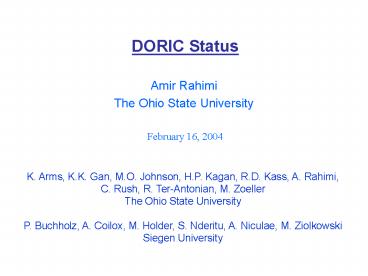DORIC Status PowerPoint PPT Presentation
1 / 15
Title: DORIC Status
1
DORIC Status
- Amir Rahimi
- The Ohio State University
February 16, 2004
K. Arms, K.K. Gan, M.O. Johnson, H.P. Kagan, R.D.
Kass, A. Rahimi, C. Rush, R. Ter-Antonian, M.
Zoeller The Ohio State University P. Buchholz,
A. Coilox, M. Holder, S. Nderitu, A. Niculae, M.
Ziolkowski Siegen University
2
Outline
- DORIC Specifications
- Design History
- Irradiation Results
- Summary
3
Digital Optical Receiver IC Specs
- l Decode Bi-Phase Mark encoded (BPM) clock and
command - signals from PIN diode
- l Input signal step size
- 90 mA to 1100 mA
- l Extract 40MHz clock
- l Duty cycle (50 4)
- l Total timing error lt 1ns
- l Bit Error Rate (BER)
- lt 10-11 at end of life
- Compatible with common
- cathode PIN array
4
DORIC Logic
l Training period 1ms (incl. Reset)
40MHz Recovered Clock
Delay of Trailing Edges
Delay Locked Loop Duty Cycle 50 ?
Ready for data
BPM
Recovered Data
Recovered 40MHz Clock
5
DORIC Design History
- Original design by ATLAS SemiConductor Tracker
(SCT) team - AMS 0.8 mm BiPolar in radiation tolerant
process, 4 V supply voltage - DMILL 0.8mm CMOS, radiation hard with 3.2 V
supply voltage, - 3 submissions Summer 1999 - May 2001.
- 3 meets original electrical specs
- but severe degradation of circuit performance in
April 2001 Irradiation! - Not radiation hard enough for ATLAS pixel optical
link! - Migrate to IBM 0.25mm early 2001, 2.5 V
- Enclosed layout transistors and guard rings for
improved radiation hardness - Five submissions Feb 2001 March 2003
- To date over 30 DORIC-I5e chips have been tested
- 18 chips on opto-boards
- 16 chips on test boards
6
DORIC Digital Circuitry
- edgedet produces pulses for each input
transition - clock recovery circuit uses delay-locked-loop,
consisting of dcontrol and three internal voltage
controlled delays, dflip1 and exor circuits - data recovery circuit latches the state of the
recovered clock into dfilp2 using edgedet signal
7
Timing of Digital Signals
8
DORIC-I5e Layout 2.3 X 4.0 mm
Preamp / Digital Test Pads
Output Pads Dat Dat- Clk Clk- GndD VddD
Input Pads Signal_in GndA Noise_in VddAmp VddA
Analog / Digital Bias, Resets
9
Irradiation of DORIC-I5e, August 2003
- 24 GeV proton test beam at CERN (T7)
- Cold box electrical testing of 4-channel DORIC
and VDC - Up to 62 Mrad
- Shuttle testing of optical links on opto-board
using DORIC and VDC - Up to 30 Mrad
10
Rise/Fall times
- Rise/Fall time
11
Clock Jitter, Command-Clock Delay and Duty Cycle
- Jitter ( lt 1 ns)
- Command delay wrt. clock
- Duty Cycle slightly out of spec after irradiation
- Min 45.5 (50 4)
- Measured on the test board, close to 50 on
opto-board
12
LVDS (/-) Amplitude, Average
After irrad.
Before irrad.
- (?) Clock Average/Amplitude slightly out of
spec after irradiation - Max Average 0.51 V (spec 0.2 - 0.5)
- Max Amplitude 1.52 V (spec 1.0 - 1.5)
- Command Average/Amplitude
13
Single Event Upset Error Rate
OSU
Siegen
- Bit error decreases with increasing PIN current
- Fexpect 2 x 106 cm-2 s-1, IPIN 100mA BER 3
x 10-10 - DORIC Spec 10 -11
14
PIN Current Threshold vs. Dosage
- PIN Current threshold for no bit error remain
constant
15
Summary
- DORIC-I5e meets all the specifications
- Radiation hardness of DORIC-I5e is adequate for
the Pixel system - Circuits continue to perform well after up to 62
Mrad of 24 GeV protons

